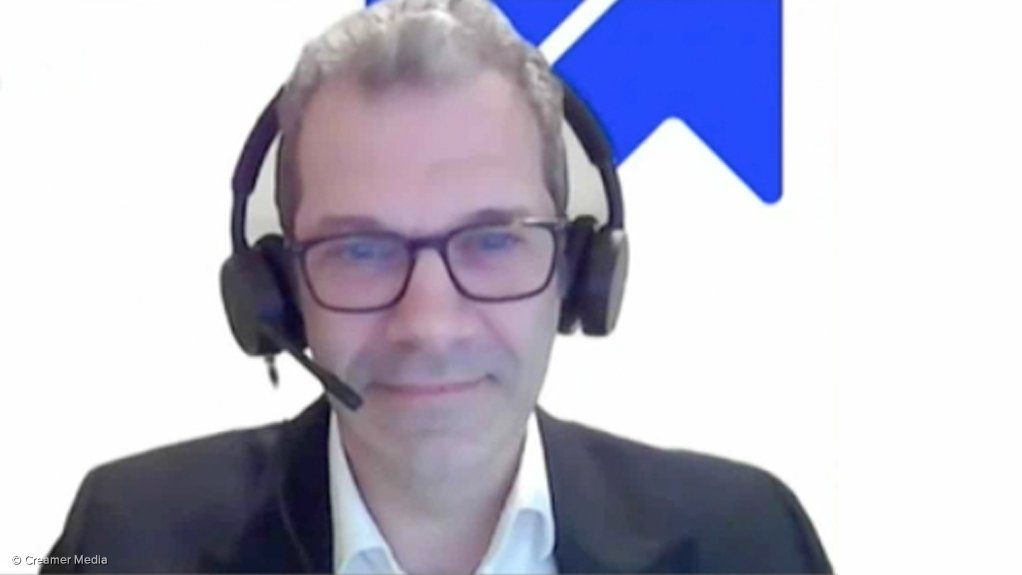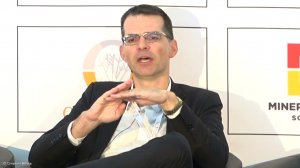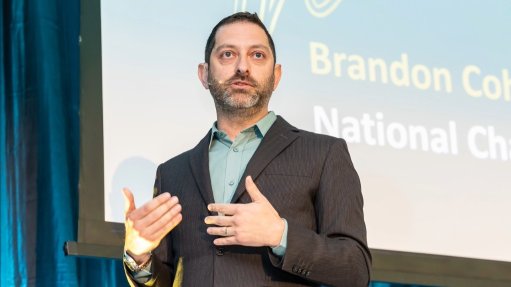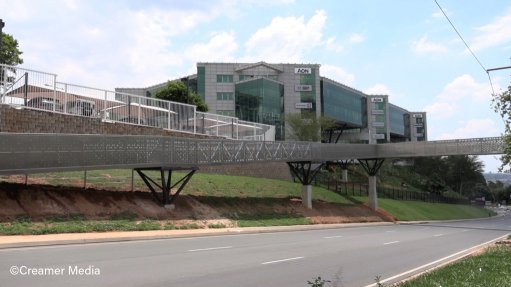Green hydrogen must be allowed to decarbonise optimally, Junior Indaba hears


Junior Indaba covered by Mining Weekly's Martin Creamer. Video: Darlene Creamer.
Robin Griffin.
Photo by Creamer Media
JOHANNESBURG (miningweekly.com) – Green hydrogen must be made cheap enough to decarbonise optimally at a time when the delay in emission reduction needs to be reversed if the world is to hit net zero by 2050.
A range of factors need to be aligned relating to policy, technology, the circular economy, social buy-in and primary supply.
“We need a whole bunch of technologies to come together to reduce our demand for metals but also to allow green hydrogen to become cheap enough to decarbonise different technologies,” Wood Mackenzie metals and mining research VP Robin Griffin told this week’s Junior Indaba in a presentation linked to that of Minerals Council South Africa chief economist Hugo Pienaar, who spoke of Eskom’s progress as being real and being based on plant performance. (Also watch attached Creamer Media video.)
Most of the $23-billion that Australia has allocated to decarbonisation over ten years is going to go into the generation of green hydrogen in the form of a $2/kg production credit.
With China being considerably more competitive, Australia is about to release its own carbon-border adjustment mechanism, similar to what Europe has. This is being done to support developers to bring green hydrogen on line, with on-going support being provided to ensure local processing.
Even with the Inflation Reduction Act incentives, North America is still a long way off being able to supply its own demand.
Needed, too, is the absolute maximisation of scrap metal recovery: “We have a huge growth in secondaries, but it's going to be slow, and we're never going to get to the point where we don't need primary metal and mineral supply,” Griffin told the event chaired by mining luminary Bernard Swanepoel and covered by Mining Weekly.
Regarding social buy-in, he said: “People, on the whole, certainly want the energy transition, but they don’t want mining and they haven’t quite worked out that the energy transition and mining are inextricably linked.
“One of the things that makes life difficult is that the energy transition is so metals-intensive,” said Griffin, who displayed a slide which pointed out that demand for copper in offshore wind is 15 times more intense per gigawatt than the demand for copper in a coal-fired power station.
The leveraging from fossil fuel to metal generates enormous potential demand and battery raw materials have massive growth rates.
The ask is enormous and there are all manner of impediments to the required investment rate, not least the practice of mining companies sending a lot of capital back to their shareholders in the form of dividends.
An acceleration of final investment decisions for major projects is needed to close supply gaps.
The net-zero case doubles the demand for copper and trebles it for aluminium, with even cobalt becoming a major issue.
“You need everything, everywhere, all at once to get us on the net-zero path.” was Griffin’s comment.
Pienaar zoomed in on South Africa-specific commodities and displayed the trends in rands, with the focus on gold, iron-ore, coal and platinum group metals.
On the South African electricity situation, Pienaar made the point that a sustained improvement in Eskom’s operational performance would be to the benefit of the domestic coal sector given how much South African coal is used by Eskom.
On South Africa’s 50-plus days without loadshedding, he reiterated that Eskom was not burning more diesel.
“In fact, they are burning much less diesel than this time last year. This improvement is not a diesel story, it is really a story of plant performance starting to improve, given increased maintenance over the last 12 months or so, and long may it last. I must say I don't think this is an election gimmick. We think there is real progress being made,” Pienaar emphasised.
Article Enquiry
Email Article
Save Article
Feedback
To advertise email advertising@creamermedia.co.za or click here
Comments
Announcements
What's On
Subscribe to improve your user experience...
Option 1 (equivalent of R125 a month):
Receive a weekly copy of Creamer Media's Engineering News & Mining Weekly magazine
(print copy for those in South Africa and e-magazine for those outside of South Africa)
Receive daily email newsletters
Access to full search results
Access archive of magazine back copies
Access to Projects in Progress
Access to ONE Research Report of your choice in PDF format
Option 2 (equivalent of R375 a month):
All benefits from Option 1
PLUS
Access to Creamer Media's Research Channel Africa for ALL Research Reports, in PDF format, on various industrial and mining sectors
including Electricity; Water; Energy Transition; Hydrogen; Roads, Rail and Ports; Coal; Gold; Platinum; Battery Metals; etc.
Already a subscriber?
Forgotten your password?
Receive weekly copy of Creamer Media's Engineering News & Mining Weekly magazine (print copy for those in South Africa and e-magazine for those outside of South Africa)
➕
Recieve daily email newsletters
➕
Access to full search results
➕
Access archive of magazine back copies
➕
Access to Projects in Progress
➕
Access to ONE Research Report of your choice in PDF format
RESEARCH CHANNEL AFRICA
R4500 (equivalent of R375 a month)
SUBSCRIBEAll benefits from Option 1
➕
Access to Creamer Media's Research Channel Africa for ALL Research Reports on various industrial and mining sectors, in PDF format, including on:
Electricity
➕
Water
➕
Energy Transition
➕
Hydrogen
➕
Roads, Rail and Ports
➕
Coal
➕
Gold
➕
Platinum
➕
Battery Metals
➕
etc.
Receive all benefits from Option 1 or Option 2 delivered to numerous people at your company
➕
Multiple User names and Passwords for simultaneous log-ins
➕
Intranet integration access to all in your organisation
















